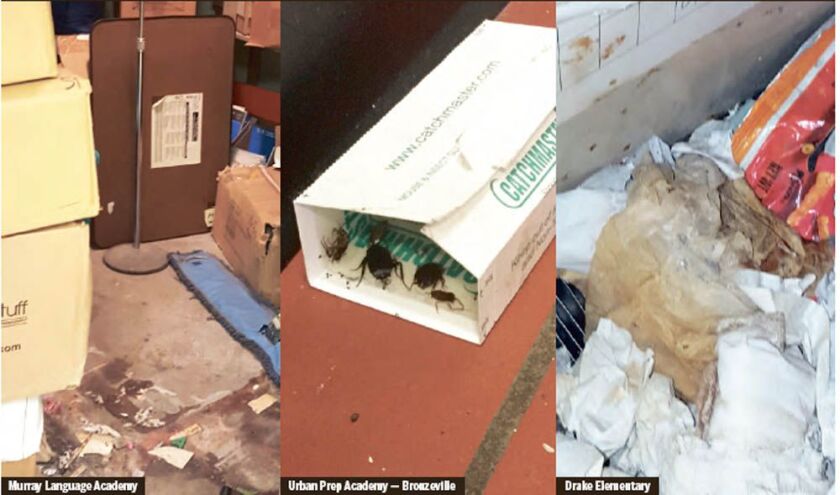Hundreds of workers will still be private employees. Service requests will still go to a central staff. There will still be a vendor contract worth hundreds of millions of dollars.
But after years of outsourced management that featured filthy schools and slow service response times, the cleaning and maintenance of Chicago Public Schools’ 600-plus buildings is coming back under district control in October, with promises from district officials for increased staffing, better transparency and improved response times.
A year after announcing it would transition away from its maligned relationship with Aramark and Sodexo, the district on Monday is unveiling its new facilities management model — including a three-year, $375 million contract with new vendor Jones Lang LaSalle — that officials hope will fix longstanding problems.
The move is the latest in a series of initiatives — along with a new district-wide curriculum, a COVID-19 recovery plan and the regained control of schools under private management — announced in the last couple weeks of outgoing CEO Janice Jackson’s tenure.
Under the old model, fully implemented in 2017, vendors Aramark and Sodexo had complete control of CPS’ building upkeep, from janitorial work to landscaping, snow removal and pest control services. Any subcontracts went through those two vendors, as did principals’ service requests. And the vendors had their own management and human resources staffing.
The outsourcing of those management responsibilities had long been viewed by critics as a short-term cost saver that disregarded school cleanliness and upkeep. A Chicago Sun-Times series in 2018 revealed filthy, pest-filled conditions at dozens of schools managed by Aramark that failed surprise inspections, even as the district signed contracts to expand the company’s work.
CPS’ three-year contract with Aramark and Sodexo that was set to end last year cost $460 million. The one-year renewal until this summer that allowed time for a phase-out was another $180 million, and a three-month extension through September cost CPS yet another $74 million. That brought the grand total to more than $700 million over four years.
Starting Oct. 1, all that work will move into the district’s Facilities Department, which will hold all subcontracts and manage building maintenance and emergency requests for all 70 million square feet at CPS.
Principals still won’t have as much control of their buildings as they did before the work was outsourced — that management will become the responsibility of central office staff. CPS will have a new, district-run online request system for facilities needs where principals can track their ticket, plus a hotline for emergencies.
Officials are counting on their direct hand in that work to lead to better responsiveness, service and transparency, while allowing principals to focus on education, said Clarence Carson, CPS’ facilities chief.
“What we’re doing now is putting it back into the hands of the district through a centralized management model but through the department,” Carson said in an interview.
“We own this solution, we own this model, we are responsible for it. And we’ll make sure it works out.”
JLL will provide supplementary staffing and give advice where needed, the district said, essentially building out CPS’ team instead of running it. The exact share between CPS- and JLL-employed staff wasn’t yet clear, Carson said. IUOE Local 399 building engineers will continue to service CPS buildings but all will be contracted through JLL, not CPS. Unlike the Aramark and Sodexo years, however, the district will oversee those workers.
Carson vowed to bring on another 100 building engineers, taking the total to more than 600, essentially one per school as was the case before management was outsourced. And the district will maintain the increased custodial staffing from the past year of COVID-19 protocols, Carson promised.
CPS put out an international request for information to learn how different organizations manage their facilities. Using that feedback and principals’ input, Carson came up with the idea for this model.
Principals were primarily concerned with the lack of transparency, accountability, responsiveness and internal control with the old system, Carson said.
Lindy McGuire, CPS’ acting chief operating officer, said the district believes the new model is responsive to those principal complaints.
“We have heard from them, they want more control, they want better service,” she said. “And this model will provide greater control for CPS and therefore greater control for the principals.”






